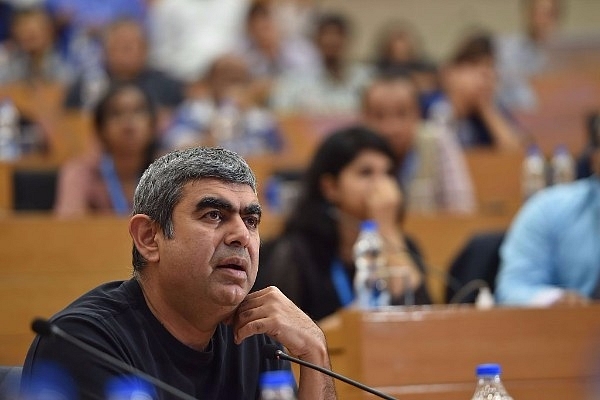Business
The Grave Implications Of Infosys’s Moves
- Though it will take some time to play out, it is highly unlikely that Infosys CEO Vishal Sikka will be able to assert his authority to drive radical changes any more.

Vishal Sikka CEO of Infosys Technologies Ltd. (MANJUNATH KIRAN/AFP/Getty Images)
Being presently out of the country, I was taken unawares by reports of some significant moves by Infosys Limited. Many foreign institutional investors I am in touch with have shown a keen interest to understand the true implications of these moves.
At the outset, even at the cost of sounding immodest, it is worth remembering that I had raised, in these very columns on 18 July 2016 and 21 October 2016, the necessity of a board committee, specifically Ravi Venkatesan and D N Prahlad, to guide CEO Vishal Sikka in leading this very difficult transition much before the recent controversies had erupted.
And actually during the phase where the popular press and “pundits” were simply amusing their respective audiences with the alacrity with which they were busy creating demigods out of mere mortals much before the complexity of the turnaround at Infosys had fully played out.
Having said that, I am on record as having said that it is not only Infosys but the entire Indian IT industry, which will benefit from the success of Sikka in turning around Infosys.
This is so because, at the current juncture, the entire leadership of all the top Indian IT services companies (I am not including Cognizant Technology Solutions Corp.) is largely devoid of the necessary skill sets needed to navigate the disruptive challenges facing the industry.
Erstwhile chief financial officers, accountants and operational managers cannot be expected to have the combination of core technological perspective and strategic capabilities necessary to face the current onslaught of four concurrent seismic shifts of the macro environment and reinvent the business model whilst cannibalizing the existing revenue streams to prepare the industry to remain relevant in the context of the massive disruptive forces facing it today.
Sikka is the only leader who has this skill set and, to that extent, N R Narayana Murthy and K V Kamath must be complimented for seeing this need many years ago and hiring him. The others are still constrained with managing the respective companies with outdated leadership skill sets even today.
It is in this context that the moves at Infosys need to be evaluated for their true intent and implications. The aspirational 20 billion dollars by March 2021 revenue target, totally associated with Sikka, has been dropped, a committee has been put in place to advise Sikka, and an external agency has been engaged to evaluate the board members.
Though it will take some time to play out, it is highly unlikely that Sikka will be able to assert his authority to drive radical changes any more, or will indeed be motivated enough to see things through.
Taking on Accenture by building a consulting-led scalable organisation to lead the transformative challenges in global customer engagements is a task which requires both time, money and risk-taking abilities including targeted mergers and acquisitions. This will almost certainly be difficult to achieve now.
R Seshasayee, a staunch supporter of Sikka, in his role as the chairman, may slowly be marginalised in the new scheme of things though he is too much of a professional to simply hang around for too long if indeed things play out in this manner. The loser in all this will be the IT industry and, of course, Infosys itself.
The gracious way would have been to simply guide Sikka through a committee of the board and not a public humiliation precipitated by the two other simultaneous moves. This would have allowed Sikka to use the sagacity and wisdom of Ravi Venkatesan to navigate the present phase without the Damocles sword hanging over him.
Having seen “highly reputed consultants” like Egon Zehnder from very close quarters, I am sceptical of the value they would bring in the current environment apart from emerging on the right side of the final outcome. Failure of Infosys will not portend well for the Indian IT industry in general as there will be no model to copy if Infosys itself does not succeed.
The four mega trends threatening India’s competitive advantage are just too powerful—cloud-based services led by increasing levels of automation, massive technological changes, reversal of globalization and general global economic and geopolitical realignment-related uncertainty—and I would have thought the Indian IT industry’s best chance to reinvent itself should have been given more leeway and encouragement.
But as Peter Drucker had said: Culture eats strategy for breakfast! Surprising, though, that retired iconic promoters could yield such clout and potentially change the course of destiny in a game where the stakes are far higher than merely dealing with a cultural mismatch.
This article was originally published in Mint and has been republished here with permission.
Introducing ElectionsHQ + 50 Ground Reports Project
The 2024 elections might seem easy to guess, but there are some important questions that shouldn't be missed.
Do freebies still sway voters? Do people prioritise infrastructure when voting? How will Punjab vote?
The answers to these questions provide great insights into where we, as a country, are headed in the years to come.
Swarajya is starting a project with an aim to do 50 solid ground stories and a smart commentary service on WhatsApp, a one-of-a-kind. We'd love your support during this election season.
Click below to contribute.
Latest